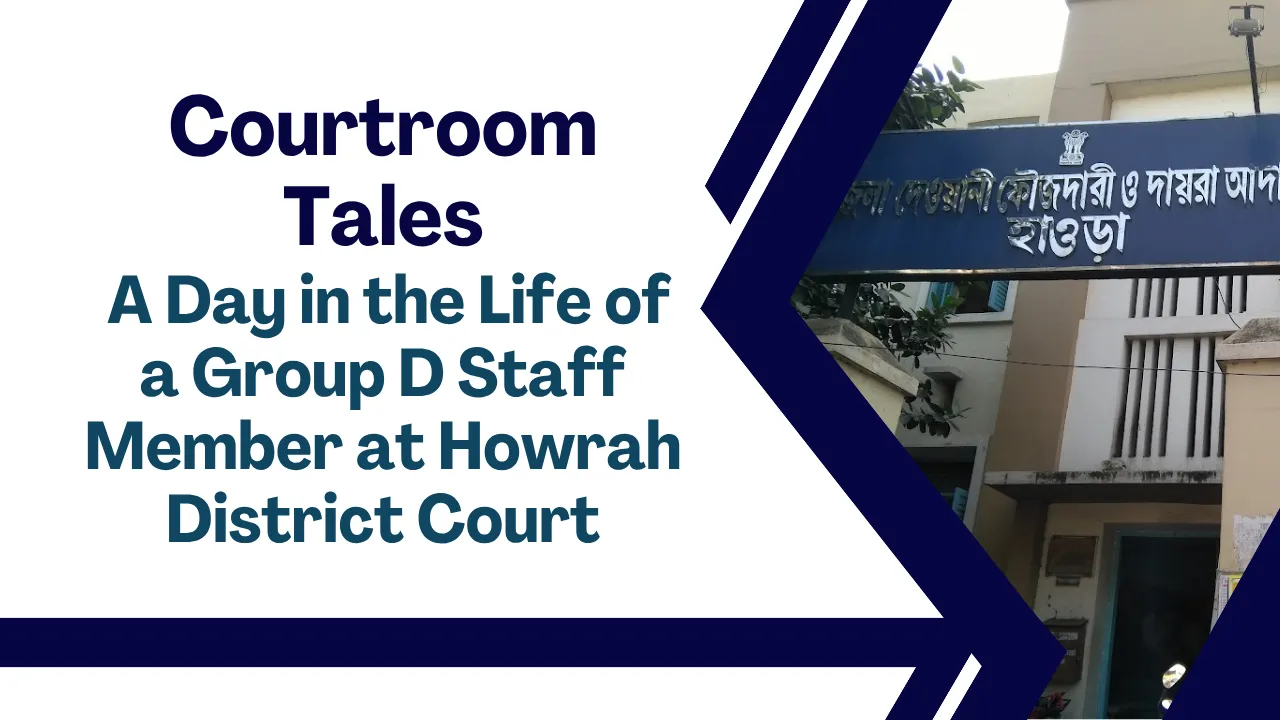A Day in the Life of a Group D Staff Member at Howrah District Court: The heartbeat of any courthouse doesn’t just come from formal proceedings—it also echoes through the tireless efforts of Group D staff. In the bustling corridors of Howrah District Court, peons, farash (sweepers), night guards, drivers, and messengers ensure everything runs smoothly. Their dedication sustains the judicial ecosystem, supporting lawyers, judges, and litigants with logistical precision and a human touch.
This article takes you behind the scenes of Courtroom Tales: A Day in the Life of a Group D Staff Member at Howrah District Court. From dawn’s first sweep to the final lock-up, discover the routines, relationships, and resilience of these essential staff members whose roles often go unnoticed but remain vital to court efficiency.
Courtroom Tales: A Day in the Life of a Group D Staff Member at Howrah District Court
At Howrah District Court, Group D staff form the backbone of day-to-day operations. Peons unlock courtrooms and deliver files, farash ensure clean and dignified spaces, night guards preserve security, messengers ferry documents, and drivers transport officials. Their tasks may seem basic, but each routine is essential—uplifting the court’s rhythm with punctual service, respectful conduct, and mutual respect. Throughout busy case hearings and quiet nights, these staff members foster order, dignity, and continuity in judicial life.
Daily Routines Overview
| Role | Morning Tasks | Daytime Duties | Evening & Night Shifts |
| Peon | Open courtrooms, arrange files, serve notices | Retrieve documents, assist litigants | Return files, lock rooms, update logs |
| Farash | Sweep halls, prep restrooms | Clean benches, empty bins, guide visitors | Night cleaning, prepare for next day |
| Night Guard | Inspect lock systems, early patrols | Monitor corridors, control access | Guard premises, check alarms, log activity |
| Messenger | Deliver mail, collect records | Rush documents between offices | Sort undelivered mail, prep next day materials |
| Driver | Ready vehicles, check fuel/tires | Transport staff, attend emergency errands | Park and secure vehicles, prep for next shift |
Peons: The Courtroom Facilitators
Peons at Howrah Court start their day early, around 6 AM. They open doors, switch on lights and fans, and organize files before the morning session begins. Rabi, a senior peon, ensures that each courtroom gets its required paperwork, walking countless steps across corridors. During hearings, he frequently delivers documents or summons to judges. When breaks occur, he quietly serves tea and maintains order in the registry. At the end of the day, Rabi ensures each file is returned, rooms locked, and logs updated—ensuring the court’s continuity.
Farash: Keepers of Cleanliness
Farash staff arrive even before peons, around 5:30 AM, armed with mops, brooms, and detergent. They clean floors, chairs, and trash bins before the court opens. Senior farash, Sunita, also sanitizes restrooms and refills water stations. They discreetly guide visitors to maintain courtroom decorum. Afternoon spills are handled quickly so hearings continue uninterrupted. By evening, they refresh public spaces and prepare for the next day’s activities. Their work safeguards hygiene and upholds the dignity of the judicial setting.
Night Guards: Silent Protectors
Starting at 6 PM, night guards like Das ensure the court is secure after hours. Initial tasks include checking entry points, securing evidence rooms, and verifying judge’s chambers. During the day, they patrol, monitor CCTV feeds, and assist staff leaving late. When emergencies occur—like power failures—they manage generators. At midnight, they finalize security logs, ensuring the court remains safe until morning. Their vigilance maintains trust and peace within institutional walls.
Messengers: Courthouse Couriers
Messengers are the court’s fastest runners. Early in the day, they collect notices and vital records from the registry. They replace files mid-hearing and deliver court orders swiftly to concerned offices. During rush hours, they speed through corridors with heavy documents. Tarun, a messenger, often saves emergency situations by rushing medical reports for hospital-linked hearings. In the evening, he collects undelivered mail and prepares for next-day distribution. Their coordination keeps the court’s information system alive.
Drivers: The Wheels Behind Justice
Court vehicles are driven by Group D staff who prepare them before sunrise. They ensure fuel, tire and engine health, and cleanliness. Throughout the day, drivers assist judges traveling to nearby courts, transport documents to police stations, or collect important records. In emergencies, they are on standby. After office hours, they park the vehicles, lock garages, and plan routes for the next day. Their reliable service ensures the court’s logistical needs are met seamlessly.
The Human Side of Service
Beyond tasks, Group D staff at Howrah Court form a tight-knit community. They share meals, stories, and laughter—even during rain or comfortless nights. When a senior advocate fainted, a night guard guided him to first-aid, staying until help arrived. Messengers greet frequent visitors by name, easing their anxiety. Farash staff offer kind words to visitors overwhelmed by legal process. These humane moments create a respectful and empathetic atmosphere beneath the courtroom’s formal facade.
Why These Roles Matter
- Continuity: Court sessions run on time, with files and rooms ready.
- Public perception: Cleanliness and order maintain trust in the justice system.
- Security: Night guards prevent untoward incidents and protect evidence.
- Efficiency: Legal staff are freed from administrative tasks, focusing on court work.
- Human connection: Small gestures by Group D staff make the courthouse more approachable.
FAQs
1. What training do Group D staff receive?
They undergo an orientation covering court protocol, document handling, basic communication, hygiene, and security procedures.
2. What are typical working hours?
Most Group D staff work in shifts: early morning (5–1), daytime (9–5), and night (5–1). Rotational rest days are scheduled.
3. Are these permanent positions?
Yes. Group D staff are usually permanent or contractual employees hired via the DJ Howrah Recruitment, with benefits such as health coverage and pensions.
4. How do staff interact with advocates or litigants?
Peons and messengers assist visitors by guiding them to correct counters and aiding with basic queries, always maintaining professional courtesy.
5. How is performance evaluated?
Supervisors assess punctuality, task completion, cleanliness, helpfulness, and conduct. Outstanding performance may earn recognition or minor promotions.
Final Thought
Courtroom Tales: A Day in the Life of a Group D Staff Member at Howrah District Court celebrates the unsung dedication of those who support our legal system behind the scenes and around the clock. Their unwavering presence at dawn or dusk keeps justice alive in every hearing. Recognize their contribution—not just the formal roles but the human warmth they bring to a system that upholds law and order.















